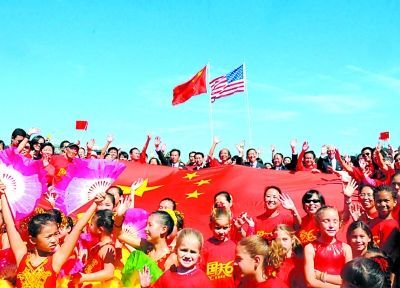If the American national flag were raised over Tian'anmen Square
On my way home yesterday, I read an interesting tidbit in the Legal Evening News. It said that at 10:00 p.m. on September 20 (Beijing time), overseas Chinese in Washington got together on the south lawn of the White House and raised the Chinese national flag to celebrate the 60th birthday of China.
I looked up more info on the story, which I've summed up as follows:
On September 20, the national flag of the People's Republic of China (PRC) was raised over the south lawn of the White House, with around 2,000 people participating in the ceremony.
 |
|
Overseas Chinese and American children gathered on the square before the White House to celebrate the 60th birthday of China. [cnsphoto] |
Americans seemed happy to see the Chinese national flag fly outside the White House. The Legal Evening News reported that some foreigners also attended the ceremony. In addition, 57 American children from various Washington schools give a performance of gymnastics, and the banner they presented afterwards, with "Hello, China" written in both Chinese and English, drew enthusiastic applause.
The story got me thinking, if the reverse happened, and the American national flag was raised over Tian'anmen Square on Independence Day, what would Chinese people think? I would guess that condemnation would be poured out all over the internet and the flag-raising would be considered a provocation of China.
Herein lies the difference: self-confidence. It's just a flag-raising, what can it change? It can change nothing, so go ahead and raise it. If you're happy and it doesn't hurt us, you can do it. However, the Chinese always feel a weakness inside; they're not generous enough and not confident enough. They like to read into things. In this regard, we should learn from the Americans.
Taking the celebration of the 60th birthday of PRC as an opportunity, let's assume the self-confidence of an old civilization and a great country.
The report mentioned that it took nine years of applications by overseas Chinese associations before the five-star red flag was finally raised outside the White House, which means the previous eight times, the applications were refused. What does success in the ninth year indicate? The applicants said this attempt benefited from Sino-US friendship, making me think there's something to it.
Considering how Vice Premier Wang Qishan received "super courteous reception" from President Obama when visiting the U.S., you might notice that the U.S. has gotten smarter about its relationship with China: They've improved both their hard power and softer power. The US brains know that Chinese people are concerned with saving face, so they did a good job here. But in terms of national interest, the two nations are diametrically opposed.
I say so because China and the U.S. had good discussions in the strategic and economic dialogue at the end of July, but the U.S. didn't hesitate to impose special protectionist tariffs on tire imports from China. Similar events will probably happen again and we have to stay clear-headed about it.
(This blog was first published in Chinese on September 22 and translated into English by Zhou Jing.)
 0
0 







Comments